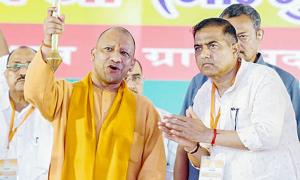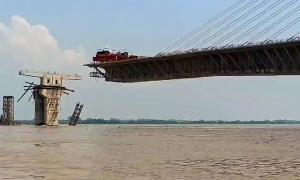With Prime Minister Atal Bihari Vajpayee all set to begin his visit to Jammu and Kashmir on Friday, India's staunchest friends in the United States said a dialogue between India and Pakistan is the only way out for the hostile neighbours to resolve their half-century-old dispute.
"The key is a dialogue between India and Pakistan," Congressman Joseph Crowley, co-chair of the Congressional Caucus on India and Indian Americans, told rediff.com
The United States can play a constructive role in that process, he said. "Earlier, the Clinton administration played a role in Ireland and the Middle East and here too the US will put its best foot forward to facilitate peace."
Crowley said candidly, however, that Pakistan President Pervez Musharraf has failed to live up to his pledge to stop infiltration into Jammu and Kashmir. "We would like to see some concrete steps from President Musharraf," he said.
Crowley is visiting India with four other congressmen on the invitation of the Confederation of Indian Industry.Addressing the press in New Delhi, he said he is strongly committed to strengthening and improving cultural, political and economic relations with India.
Crowley assured the gathering that the US and the India caucus is committed to help the Indian people fight terrorism. "The US should not forget that the people of India are confronted with terrorism, particularly in the heavily contested region of Kashmir," he said.
The congressman condemned the recent massacre of Kashmiri Pandits at Nadimarg and held Pakistan-backed Islamic militants responsible for it.
But he disagreed with External Affairs Minister Yashwant Sinha's assertion that Pakistan is a more fit case for pre-emptive action than Iraq."It is true that Pakistan is a rogue state, a dictatorship like Iraq was, and there are concerns about Pakistan's nukes falling into the hands of Islamic militants, but there are differences between the two," he said. "India and Pakistan are neighbours and both are nuclear powers with huge armies. Pakistan is not the same as Iraq and there is no set solution for every problem. India and Pakistan must co-operate to make the world a safer place."
Congresswoman Sheila Jackson-Lee, who represents Houston in Texas, referred to the reconstruction of post-war Iraq and said she supports a multilateral approach with a significant role for India. "India is a viable partner in the reconstruction in Iraq," she said.
Foreign Secretary Kanwal Sibal said he felt reassured by the delegation's stand. "It is reassuring to hear strong voices from the US Congress speaking of multilateralism in rebuilding Iraq," he said. "The best way would be to get the UN involved in some way. For one might be strong enough to make war alone; none can make peace alone."
He added that India is looking at helping with humanitarian relief in a big way.Congresswoman Jackson-Lee said democracies will have to face the challenge of terrorism, but cautioned against violating the civil and political rights of individuals. "We cannot protect democracy or do business if we are tolerant of such acts," she said. "Racial profiling or isolation of ethnic or religious groups like Muslims or Indian-Americans will not be acceptable."
Commenting on Indo-US business relations, she said the US wants to do business with Indian companies, going so far as to set up joint ventures and invest in India. But Crowley said India needs to remove barriers to market access and trade. In November 2002, US Treasury Secretary Paul O'Neill had reported that India's tariffs were among the highest in Asia.
Sibal said India was working to remove these barriers. "We are negotiating a free market agreement with Singapore and offering it to ASEAN [Association of South East Asian Nations] as well."








More from rediff